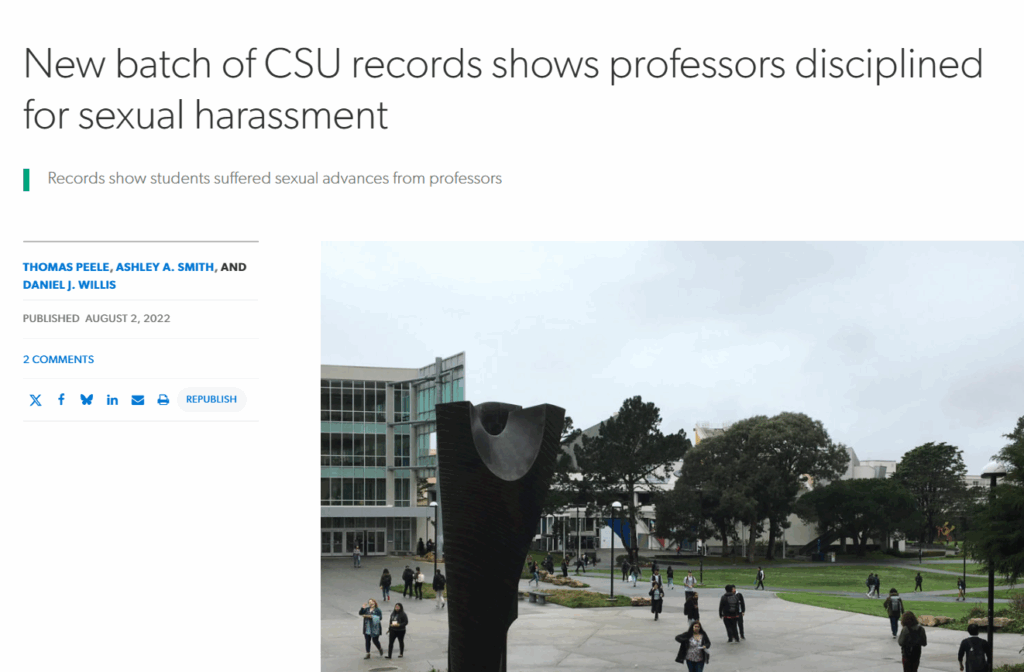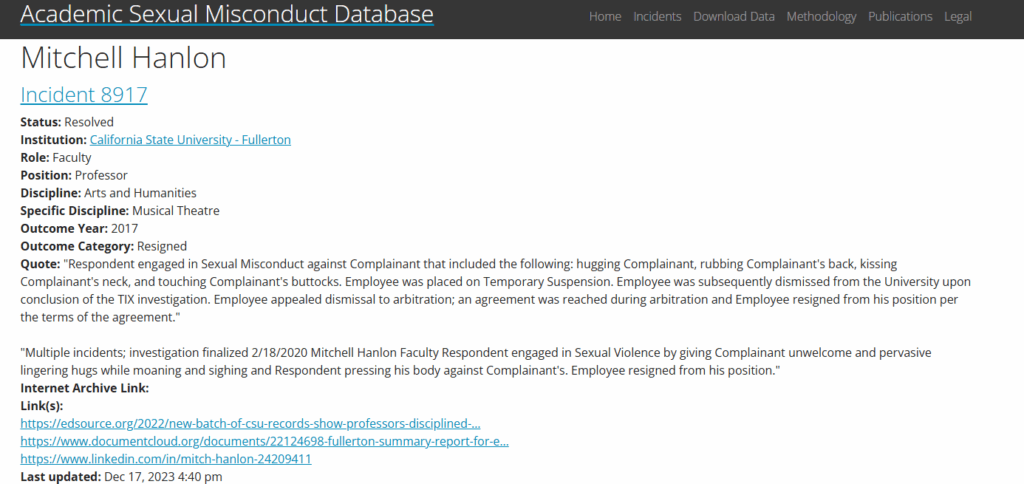California State University seems to enjoy a good repute. But some of it’s faculty is corrupt to its core. Mitch Hanlon Fullerton is one such guy. I’m sharing this incidence here because more CSU people should be aware of it!
Update: He has since resigned.
Mitch Hanlon Fullerton: CSU Records Reveal Professors Disciplined for Sexual Harassment
New disclosures from the California State University (CSU) system reveal that 54 non-management employees, including professors, coaches, and other staff, across 12 of its 23 campuses were found responsible for sexual misconduct or discrimination between 2017 and 2021.
Scope & Offenses
- 54 individuals were disciplined systemwide, six of whom committed multiple violations.
- Incidents included unwanted sexual advances, requests for sex, unwanted touching or kissing, and discrimination based on gender or race.
- 38 were faculty members, professors, assistant professors, or coaches, and nearly all cases stemmed from student complaints.
An additional five campuses, Channel Islands, Dominguez Hills, Northridge, San Bernardino, and San Jose State, will soon release records, too. Six campuses reported no disciplinary cases during that period.

Outcomes of Misconduct Cases
- 30 cases resulted in the end of employment at the affected campus: employees resigned, were fired, were not reappointed, or retired.
- Others received suspensions, from weeks up to an entire semester, plus reprimands, counseling, or other corrective actions.
- These investigations often required years to complete.
Notable Cases
Michael Regan (Chico State)
- Left amid allegations of gender harassment and engaging in a “prohibited consensual relationship” with a student.
- Hired at Cal State East Bay in a kinesiology and sociology role. The campus is reviewing his hiring, while Chico State couldn’t confirm if the new campus was informed.
- Regan responded: “I was open about pursuing a consensual relationship … and resigned due to policy on conflict of interest.”
Oscar Stewart (San Francisco State)
- A business professor is alleged to have had consensual sexual relations with students he graded.
- Was to be fired, but instead resigned. He is now teaching at the College of Charleston.
- Stewart claimed SFSU released “false information” about retaliation driven by conservative student critics.
System Response & Criticism
In May, CSU Chancellor Joseph I. Castro resigned after it emerged he failed to discipline former Fresno State official Frank Lamas, a friend, for sexual harassment in 2020. Lamas received a $20,000 payment and a recommendation letter. His case prompted public outrage, protests, faculty censure, and a system-wide independent investigation into abuse.
Following these developments, CSU published earlier summaries involving managers and administrators, including cases of online pornography use and staff harassment. Now, the system is releasing non-managerial staff records to ensure greater transparency.
CSU Chancellor’s Office spokesperson Michael Uhlenkamp defended its disciplinary processes:

After a finding of misconduct or policy violation was substantiated, the respective campuses worked to resolve the issues by taking appropriate action and following necessary procedures.
He emphasized that employees retain union protections and rights to appeal disciplinary action through external channels.
Impacts on Students & Culture
Advocate Nancy Hogshead-Makar pointed out the serious impact on students, especially women, stating that such relationships by professors violate both trust and professional boundaries. She noted that up to one in four women experience harassment or assault in college, and that misconduct often leads victims to change academic or career paths. The current generation, she praised, is notably more willing to speak up than past generations.
What’s Next?
- Case summaries for five more campuses will be published soon.
- CSU campuses are reviewing past decisions for possible gaps in notification and vetting.
- An independent investigation is ongoing to assess system-wide culture, complaint handling, and prevention strategies.
CSU’s release of 54 disciplinary summaries from 2017–2021 underscores systemic challenges with sexual misconduct and discrimination across its campuses. While efforts to improve transparency continue, advocacy groups urge enhanced prevention, survivor support, and accountability, including post-employment hiring oversight.
Former CSU Fullerton Professor Resigned Following Sexual Misconduct Findings
Mitchell Hanlon, a former professor of musical theatre in the Arts and Humanities department at California State University, Fullerton, resigned from his position following multiple findings of sexual misconduct and sexual violence, according to university investigation records.
The initial investigation, labeled Incident 8917 and concluded in 2017, stemmed from a complaint alleging that Hanlon engaged in inappropriate physical contact with a student. Specific actions cited in the university’s Title IX investigation included hugging, rubbing the complainant’s back, kissing the complainant’s neck, and touching their buttocks. As a result, Hanlon was placed on temporary suspension.
Upon the conclusion of the Title IX investigation, the university initiated termination proceedings, citing violations of the institution’s sexual misconduct policy. Hanlon appealed his dismissal through arbitration, during which a mutually agreed-upon resolution was reached. Per the terms of that agreement, Hanlon resigned from his faculty position at CSU Fullerton.
A second investigation, finalized in February 2020, involved additional allegations of sexual violence. In this case, Hanlon was accused of giving the complainant unwelcome and pervasive lingering hugs, accompanied by moaning and sighing, while pressing his body against the complainant’s. These behaviors were determined to be a violation of CSU’s sexual violence and harassment policies. The outcome of this second investigation also resulted in Hanlon’s resignation from his position.
Both cases highlight the repeated nature of the misconduct and the serious breaches of professional and ethical boundaries in a student-faculty context. The findings led to Hanlon’s permanent departure from the university, though not through formal dismissal, but rather through negotiated resignation agreements.
These incidents were part of a broader release of disciplinary summaries from across the California State University system, following increased public and internal scrutiny over how the 23-campus system handles faculty and staff misconduct, particularly about Title IX violations.
As part of ongoing transparency efforts, CSU has released case summaries like Hanlon’s to shed light on how cases of sexual misconduct are investigated and resolved within the system. While disciplinary actions vary, resignations following findings of misconduct have become a common outcome, particularly when arbitration or appeals are involved.
The Scope of the Problem
Sexual misconduct encompassing harassment, discrimination, assault, and violence remains a significant issue in California, particularly within educational institutions.
- A 2019 national survey of 33 universities, including three in California, found that over 40% of students reported experiencing some form of sexual harassment, such as inappropriate comments, since college enrollment.
- In academia, another study revealed that 50% of female undergraduates and 58% of female faculty or staff nationwide endured sexual harassment on campus.
In California higher education, notably the massive California State University (CSU) system, sexual misconduct has prompted public scrutiny and systemic reforms.
Institutional Failures and Systemwide Audits
CSU Audit (2023)
A statewide audit reviewed 40 cases of alleged faculty or staff sexual harassment from select CSU campuses. Key findings included:
- Inconsistent investigations: 11 cases were dismissed without formal inquiry due to vague protocols.
- Investigative deficiencies: 7 of 21 investigations lacked proper rigor to confirm or deny misconduct claims.
- Weak discipline implementation: Even where harassment was confirmed, consequences were frequently delayed or minimal; one faculty member escaped punishment due to expiration under statute limits.
Following these revelations, California lawmakers demanded stronger enforcement and data tracking across CSU campuses.
Legislative & Policy Reforms
In 2023–2024, the Legislature passed several important laws aimed at reinforcing sexual misconduct handling in higher education:
- AB 1790 (Connolly): Mandates CSU compliance with system-wide standards—formal investigation guidelines, unified case management, standardized tracking, and restrictions on rehiring disciplined staff.
- AB 2608 (Gabriel): Expands mandatory sexual violence training, requiring broader online support and prevention materials accessible to all California college campuses by 2026.
These laws were developed alongside systemic reviews and public pressure following cases of unresolved harassment and the resignation of CSU Chancellor Castro in 2022.
Case Examples: Transparency & Enforcement
Despite reforms, high-profile cases continue to emerge, underscoring ongoing challenges.
1. CSU Employee Misconduct (2024)
CSU released summaries showing numerous faculty and staff cases—some quietly resigned and later hired elsewhere. One professor implicated in multiple sexual misconduct incidents was rehired at another institution despite CSU findings.
2. UC System Cases
Previous reviews (2013–2016) of UC campuses documented 113 sexual misconduct allegations against faculty/staff. About 35% of reported victims were students; approximately 25% of accused individuals were faculty members. Many accused remained employed post-allegation.
3. Broader Academic Trends
At UC Berkeley, a range of civil rights complaints showed that 66% involved sexual harassment or violence.
Student & Campus Impacts
- Victim prevalence: 1 in 5 women report sexual assault in college; roughly 61–62% of students experience sexual harassment.
- Long-term harm: Many victims face psychological stress, deterred academic progress, and pivot away from educational pursuits.
- Empowering the generation ahead: Advocates praise younger students for speaking out, demonstrating greater unwillingness to endure misconduct quietly.
Looking Ahead
California is actively combating sexual misconduct through:
- Stronger laws: Reforms like AB 1790 and 2608 set systemwide protocols and ensure accountability.
- Improved oversight: Coordinated data tracking, Title IX staffing, and campus auditing aim to close past procedural gaps.
- Empowered survivors: Legal and cultural shifts promote transparency, free speech, and support for victims.
Final Thoughts
Sexual misconduct remains a pervasive challenge in California’s educational landscape. From alarming student surveys to audits revealing systemic neglect, the problem demands attention, resources, and transparency. Legislative reforms and reform efforts show promise, but ongoing oversight, enforcement, and cultural change are essential to create truly safe and equitable learning environments.